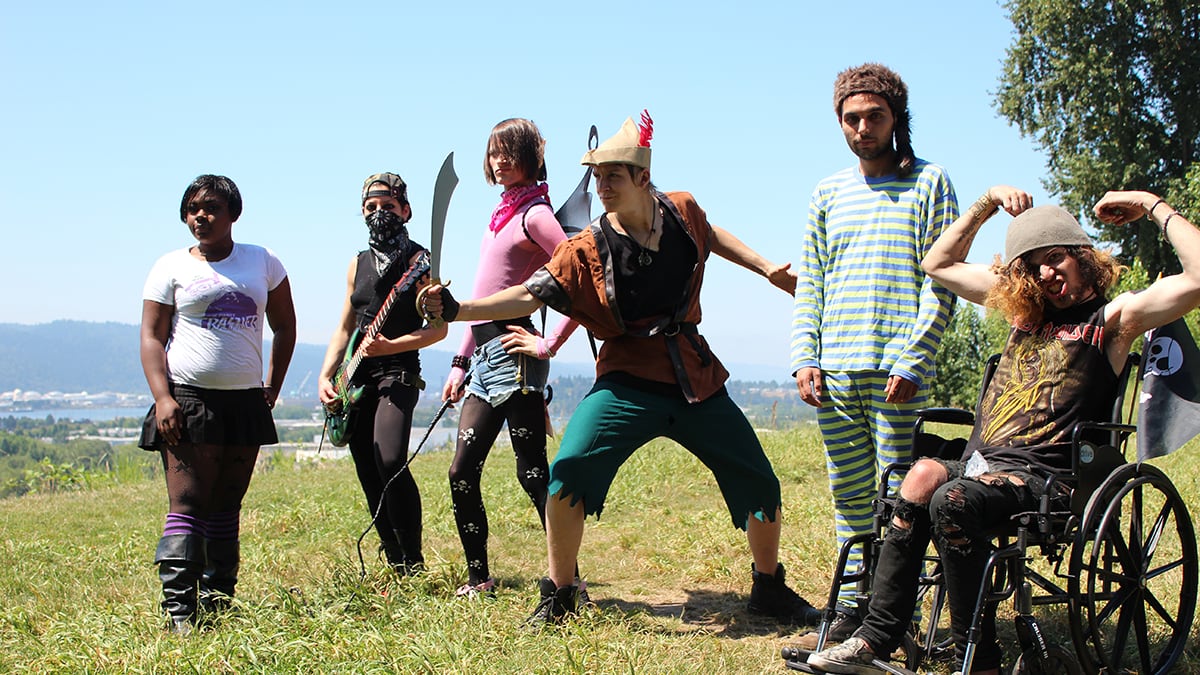The Lost Boys of Portlandia (2016) was once a snapshot of the lives and minds of unhoused Portland youth. Now, it doubles as an origin story.
The 23-minute film has become the urtext of Outside the Frame, a nonprofit that has produced hundreds of video projects as a means of engaging, educating and employing young people living on Portland's streets.
The short film depicts the fateful day in 2009 when Outside the Frame founder and executive director Nili Yosha substituted as leader of a group of unhoused youth for a screening of Disney's 1953 animated version of Peter Pan. Though she's loath, then and now, to take any focus off the students, Yosha suspected the allegory of the Lost Boys—the disappeared, rudderless orphans headed by Peter Pan—could resonate deeply.
"They're the real Lost Boys," says Yosha of the cohort documented in her film.
By far the profoundest takeaway is the students' readiness to analyze and create. The teenagers and early-20-somethings dissect Peter Pan with a depth many college English courses couldn't muster. Days later, they spring into action producing their own Portland-set riff on J.M. Barrie's tale.
"When your entire life is constantly focused around basic needs—like what you'll eat and where you'll sleep that night—it's really easy to forget about creative outlets," says Joey Whiting, one of the houseless students in the original film, who eventually became an OTF peer mentor and is now a full-time outreach worker with Washington County's HomePlate Youth Services.
"I think homeless youth are the most underestimated people in our society," Yosha says. "They need something to do, something to feel a part of, something to feel successful at, and the momentum just goes from there."
Momentum, indeed. What began as a movie day has snowballed into regular workshops and intensives (with the next one beginning Oct. 27), large screening events, contracted video work for organizations like Metro and Oregon State University and numerous jobs for program alumni.
Anecdotes abound exemplifying how far OTF and its "Lost Boys" have come.
Yosha remembers taking a group to the Portland Art Museum early on in the project, where they were conspicuously (and dispiritingly) tailed by security. In 2017, their own documentary work on homelessness was exhibited at the museum.
Whiting, who grew up adoring Todd Haynes' Velvet Goldmine, is yet another success story. They initially ended up homeless after expressing their queer, nonbinary identity in front of their conservative family. In 2012, the acclaimed Portland director presented Whiting's film work to a packed house at the Armory.
"When he came to another event, [Haynes] actually remembered me," Whiting says. "That was a trip."
This year, OTF filmmakers have documented wildfire evacuations and a housing justice town hall featuring U.S. Reps. Earl Blumenauer and Rashida Tlaib. Having served over 100 youth in 2020 thus far, the organization is also currently piloting a paid video production internship.
Beyond its tangible growth, Yosha says many of the organization's strides connect back to an interpretation of Peter Pan—or, rather, fighting one particular interpretation. In one late-blooming moment in The Lost Boys of Portlandia, a student earnestly asks whether the group's Pan pastiche should end with the Lost Boys not returning home. It's a fair question: In the literal world, home is all too often synonymous with abuse and abandonment. Given that "dilemma," Yosha insists a kind of forgiveness underlies many of OTF's success stories.
"The most important thing is that the young people in the film started to come back to the mainstream," she says. "The fact that they want to be part of society, despite being thrown away and stereotyped with the myth that it's all their fault, shows how much hope and resilience they have."
Whiting says their arduous, decadelong journey to stable housing and employment can "absolutely" be attributed to working with OTF. Confidence, a marketable skill, the space to reflect—it's all traceable to first flipping a camera's "on" switch.
"All that shit that I've been through," says Whiting, "it means something."
SEE IT: The Lost Boys of Portlandia streams at vimeo.com/170202065. You can watch all of Outside the Frame's shorts at vimeo.com/otfpdx. Free.

